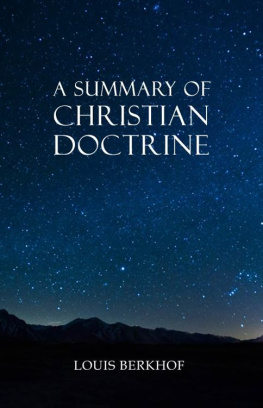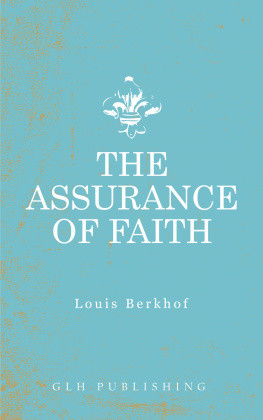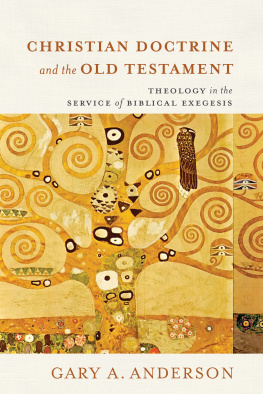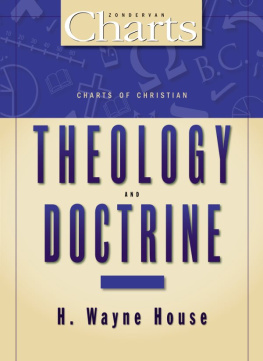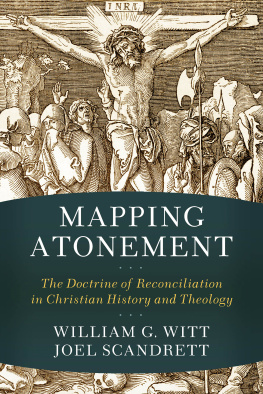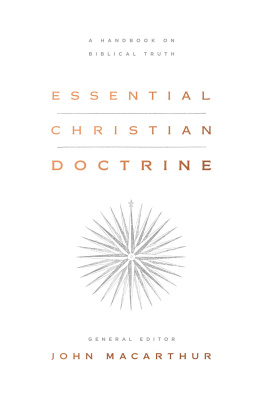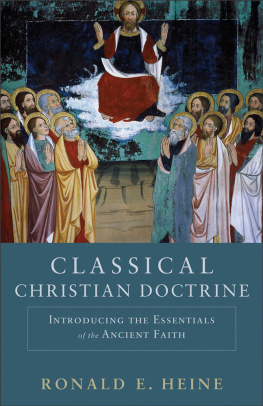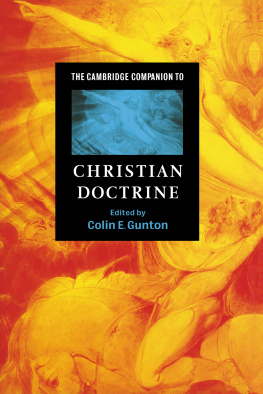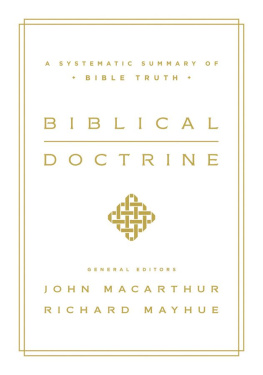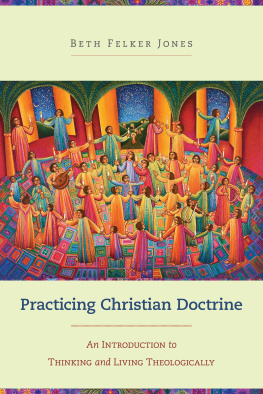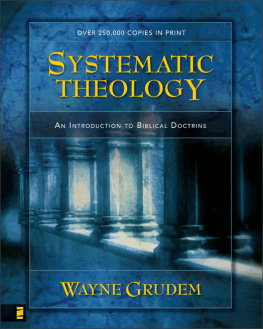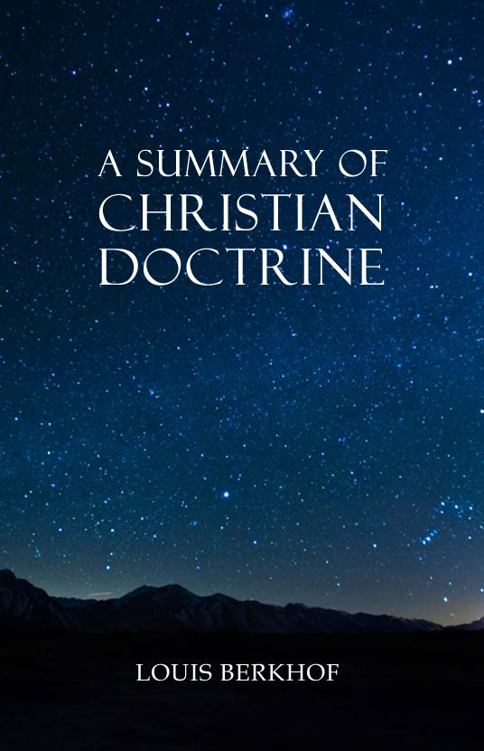Copyright Monergism Books
Summary of Christian Doctrine
LOUIS BERKHOF
Table of Contents:
Part I: Introduction
Chapter I: Religion
1. The Nature of Religion The Bible informs us that man was created in the image of God. When he fell in sin, he did not entirely cease to be the image-bearer of the Most High. The seed of religion is still present in all men, though their sinful nature constantly reacts against it. Missionaries testify to the presence of religion in some form or other among all the nations and tribes of the earth. It is one of the greatest blessings of mankind, though many denounce it as a curse. Not only does it touch the deepest springs of man's life, but it also controls his thoughts and feelings and desires.
But just what is religion? It is only by the study ofthe Word of God that we can learn to know the nature of true religion.The word 'religion' is derived from the Latin and not from any wordthat is found in the original Hebrew or Greek of the Bible. It is foundonly four times in our translation of the Bible, Gal. 1:18, 14; Jas.1:26, 27. The Old Testament defines religion as the fear of the Lord.This fear is not a feeling of dread, but of reverent regard for Godakin to awe, but coupled with love and confidence. It is the responseof the Old Testament believers to the revelation of the law. In the NewTestament religion is a response to the gospel rather than to the law,and assumes the form of faith and godliness.
In the light of Scripture we learn to understand thatreligion is a relation in which man stands to God, a relation in whichman is conscious of the absolute majesty and infinite power of God andof his own utter insignificance and absolute helplessness. It may bedefined as a conscious and voluntary relationship to God, whichexpresses itself in grateful worship and loving service. The manner ofthis religious worship and service is not left to the arbitrary will ofman, but is determined by God.
2. The Seat of Religion. There are several wrongviews respecting the seat of religion in man. Some think of religionprimarily as a sort of knowledge, and locate it in the intellect.Others regard it as a kind of immediate feeling of God, and find itsseat in the feelings. And still others hold that it consists most ofall in moral activity, and refer it to the will. However, all theseviews are one-sided and contrary to Scripture, which teaches us thatreligion is a matter of the heart. In Scripture psychology the heart isthe central organ of the soul. Out of it are all the issues of life,thoughts, feelings, and desires, Prov. 4:28. Religion involves thewhole man, his intellectual, his emotional, and his moral life. This isthe only view that does justice to the nature of religion.
3. The Origin of Religion. Particular attention wasdevoted during the last fifty years to the problem of the origin ofreligion. Repeated attempts were made to give a natural explanation ofit, but without success. Some spoke of it as an invention of cunningand deceptive priests, who regarded it as an easy source of revenue;but this explanation is entirely discredited now. Others held that itbegan with the worship of lifeless objects (fetishes), or with theworship of spirits, possibly the spirits of forefathers. But this is noexplanation, since the question remains, How did people ever hit uponthe idea of worshiping lifeless or living objects? Still others were ofthe opinion that religion originated in nature-worship, that is, theworship of the marvels and powers of nature, or in the widespreadpractice of magic. But these theories do not explain any more than theothers how non-religious man ever became religious. They all start outwith a man who is already religious.
The Bible gives the only reliable account of theorigin of religion. It informs us of the existence of God, the onlyobject worthy of religious worship. Moreover, it comes to us with theassurance that God, whom man could never discover with his naturalpowers, revealed Himself in nature and, more especially, in His divineWord, demands the worship and service of man, and also determines theworship and service that is well-pleasing to Him. And, finally, itteaches us that God created man in His own image, and thus endowed himwith a capacity to understand, and to respond to, this revelation, andengendered in him a natural urge to seek communion with God and toglorify Him.
To memorize. Scripture passages bearing on:
a. The Nature of Religion:
Deut. 10:12, 13. "And now, Israel, what doth Jehovahthy God require of thee, but to fear Jehovah thy God, to walk in allHis ways, and to love Him, and to serve Jehovah thy God with all thyheart and with all thy soul, to keep the commandments of Jehovah, andHis statutes, which I command thee this day for thy good."
Ps. 111:10. "The fear of Jehovah is the beginning ofwisdom; a good understanding have all they that do His commandments:His praise endureth for ever."
Eccl. 12:13. "Fear God and keep His commandments; for this is the whole duty of man."
John 6:29. "This is the work of 'God, that ye believe on Him whom He hath sent."
Acts 16:31. "And they said, Believe on the Lord Jesus, and thou shalt be saved, thou and thy house."
b. The Seat of Religion.
Ps. 51:10. "Create in me a clean heart, 0 God; andrenew a right spirit within me." Also vs. 17. "The sacrifices of Godare a broken spirit; a broken and a contrite heart, 0 God, thou wiltnot despise."
Prov. 4:23. "Keep thy heart with all diligence; for out of it are the issues of life."
Matt. 5:8. "Blessed are the pure in heart: for they shall see God."
c. The Origin of Religion.
Gen. 1:27. "And God created man in His own image, in the image of God created He him."
Deut. 4:13. "And He declared unto you His covenant, which He commanded you to perform, even the ten commandments."
Ezek. 36:26. "A new heart also will I give you, and anew spirit will I put within you; and I will take away the stony heartout of your flesh, and I will give you a heart of flesh."
For Further Study of Scripture.
a. What elements of true religion are indicated in thefollowing passages: Deut. 10:12; Eccl. 12:13; Hos. 6:6; Micah 6:8; Mark12:33; John 3:36; 6:29; Acts 5:31; Rom. 12:1; 13:10; Jas. 1:27.
b. What forms of false religion are indicated in thefollowing passages: Ps. 78:35, 36; Isa. 1:11-17; 58:1-5; Ezek. 33:31,32; Matt. 6:2, 5; 7:21, 26, 27; 23:14; Luke 6:2; 13:14; Gal. 4:10; Col.2:20; II Tim. 3:5; Tit. 1:16; Jas. 2:15, 16; 3:10.
c. Name six instances of true religion. Gen. 4:4-8;12:1-8; 15:17; 18:22-33; Ex. 3:2-22; Deut. 32:33; II Kings 18:3-7;19:14-19; Dan. 6:4-22; Luke 2:25-35; 2:36, 37; 7:1-10; II Tim. 1:5.
Questions for Review
1. Is religion limited to certain tribes and nations?
2 .How can we learn to know the real nature of true religion?
3. What terms are used in the Old and New Testament to describe religion?
4. How would you define religion?
5. What mistaken notions are there as to the seat of religion in man?
6. What is the center of the religions life according to Scripture?
7. What different explanations have been given of the origin of religion?
8. What is the only satisfactory explanation?
Part I: Introduction
Chapter II: Revelation
1. Revelation in General. The discussion of religionnaturally leads on to that of revelation as its origin. If God had notrevealed Himself, religion would have been impossible. Man could notpossibly have had any knowledge of God, if God had not made Himselfknown. Left to himself, he would never have discovered God. Wedistinguish between God's revelation in nature and His revelation inScripture.

